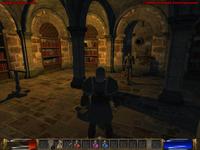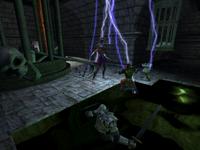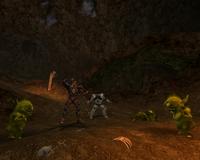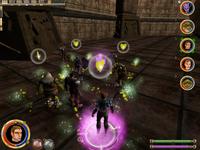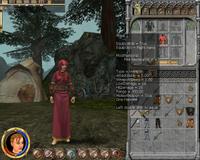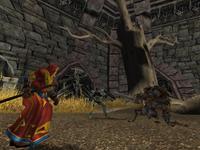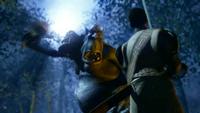|
|
|
Main News Forums Games Games Database Top 100 Release List Support Files Features Reviews Previews Interviews Editorials Diaries Misc Download Gallery Music Screenshots Videos Miscellaneous Staff Members Privacy Statement |
Ultima X: Odyssey Preview
The Ultima name spans over twenty years and better than fifteen games (depending on how you count), and boasts a rabid fan base that few franchises would be able to touch. However, with the only current iteration of the series being Ultima Online, many fans of the classic single player games (in particular, Ultima IV & VII) have found themselves left out in the cold, and following Origin's announcement in 1999 that Ultima IX: Ascension would be the end of the single player Ultima series, it seemed a dim hope that the series would ever rise to the heights of those classic games again. Times change, though, and it seems that the proper successor to the Ultima throne is about to arrive. Except… it's an MMORPG. Take me to San Francisco
Over the course of two days, we got a good look at the game, as well as hands-on time with a pre-alpha build, answers from the development team on game fiction, features, and development progress, and a good feel for what the final game will turn out to be. First off, UXO is not designed to replace UO, nor is it an extension of that world. The two products are designed to co-exist peacefully, and UO will continue to be supported, developed, patched, and expanded upon. In addition, UXO takes place in an entirely new world, and there is no crossover with UO, nor will you be able to take your characters from UO to UXO or vice-versa. And while the new game is not intended to supplant UO, they do of course intend, and hope, that some UO players will choose to play both, as each game will offer a distinct experience unavailable by playing just one. A new beginning, Avatar Instead, UXO is both the spiritual and literal successor to the single player series that ended with Ultima IX. The game's fiction extends directly from that game, and the gameplay elements hearken back to the classic CRPG's of the Ultima series, as UXO reintroduces the virtues as a central gameplay element. The story is this: when the Avatar ascended at the end of IX, you were led to believe that he had defeated the Guardian once and for all - however, they ended up in a heated and final battle between good and evil, which is still raging… and the Avatar is losing. So he has created a world inside his mind (this part is a little vague, but corroborated) that draws from all the places he's adventured through the course of the series. Inside this new dream world - Aluncinor - he intends to teach its inhabitants to champion the virtues, become Avatars themselves, strengthening and helping him in the fight against the Guardian. That means that Ultima old-timers will come across plenty of references to the old games, and that the main gameplay focus is intended to be quite a bit different than many current MMORPG's. Fighting…
…And questing. The questing is where UXO intends to deviate from and improve upon other games in the market, and where they intend to appeal to a single player market in a multiplayer format. First, UXO is built around the virtues. For you to help the Avatar in his fight, you'll need to accept and complete quests, and as you do that, you'll make choices during the quest that will decide what virtue you decide to follow. This is where the much-vaunted Odyssey Adventure System comes in, and its aim is to serve three main purposes - first, the dev team believes that quests should come to you, not the other way around. So rather than you knowing that to get a quest, you go to see this person in this city; as you're adventuring through the world, the game will generate NPC's that will find you and give you quests - and it'll be at your discretion whether or not you accept them. Second, the quests are designed to be complex and multi-branching, giving you a decidedly more CRPG feel, as some quests may even build on each other, and more details about what you're doing and possible motivations are revealed as you make your choices. And third, as you accept quests, you'll have the option of undertaking those quests in private areas, ensuring that the quest will remain unbroken, and that only you and your party will have the experience of completing it. Also, both quests and random encounters will be scalable, allowing you to play either by yourself, or with a party of friends, and still encounter a challenge. Finally, since the quests are branching and dependent on dialogue, if you have to leave the game session in the middle of a quest, you can come back to it at the last branch you completed, allowing for a minimum of backtracking. Following the Virtues
Features in the Future At this time, the two features I mentioned constitute the majority of the game. The team intends to launch with no fewer than 300 discrete quests, most of them requiring between 20 minutes and one hour to complete, although there will also be multi-part, complex quests that can take much longer. Other features like crafting and player housing are being discussed for a first expansion, some time fairly soon after launch. The basic ideology of the team, as expressed by Rick Hall, is "instead of doing 1000 features ok, do 100, and make them deep and fun." If they succeed in doing that, it'll ensure a much smoother launch than many games undergo, but they also run the risk of players with a lot of time to spend in Aluncinor finishing what there is to do and wanting more. They intend to have future expansions done quickly enough to satisfy this demand, and it will be vital to UXO's success that they do. However, the future development of the game will be made easier by the fact that the dev team has the ability to hot patch the game on the fly - possibly eliminating the need to ever bring down the server to change the world, and greatly reducing the need for you to download and install patches. Intelligent items (might be smarter than you) Without crafting, the economy will be mostly limited to in-game trading between players, made possible through some kind of (unfinished) bazaar system, but another feature of UXO will make this a bit more interesting - your items can level. That's right, as you quest and fight and recover treasure, your enemies will occasionally drop intelligent items. These items - from amulets, to weapons, to armor - will gain experience with you, leveling and becoming more powerful, and in some cases, you'll even be able to spend virtue points on them, making them even more customizable. Obviously, this will create valuable items that can be traded within the game, and without crafting or housing, will also constitute one of the main uses for gold, although internal discussions continue about other ways to spend your wealth. Dying in the game isn't fully formed yet, but as one of the main design philosophies is to make the game quick to get into and quick to enjoy, the penalties at this stage would seem to be slight - you probably won't lose any of your items or need to make corpse runs, and you may spawn as close as the nearest moongate. Traveling the world That's right, moongates are in the game, and provide the main mode of travel around Aluncinor. The world is not seamless; it is divided into what will be, at launch, at least 55 separate zones. Some are larger than others, and while Rick Hall was unable to estimate size in terms of square mileage, he could say that the largest zones would take on the order of 6-7 minutes to walk all the way across, while some smaller ones would take 3-4. It'll be a decent sized world, although there's room to grow. Though there is no method of faster travel at this point, mounts are being discussed, and there are several features that make travel easier - first, once you find a moongate, you can travel to that moongate from any other in the world. So once you've spent a little time adventuring, at least the edges of any area will be fairly close by via a moongate. Second, when you come online, if you want to join your party and they're nowhere near you, you can teleport directly to anyone who has you on their buddy list - another feature inspired by wanting to make the game accessible and fun - as Rick said, "if you're not having fun in ten minutes, we're not doing our job." The look
Your virtual life in Aluncinor Character creation and leveling has two main elements, along with the previously mentioned virtue system - abilities and skills - and in a different approach from most systems, you actually gain points to spend on these constantly. There are two meters in the lower right of the screen that show how your experience is being distributed, and every time you gain a point, you can spend it immediately. Going up a level is essentially just marking progress, although you may gain a point right around that time. The abilities are quite basic, consisting of strength, dexterity, intelligence, and constitution, although a host of derived statistics come from these four things. Skills are based on your character class, and though it is a class-based system, you can freely choose skills that come from any of the three classes that fall under your larger path. The four paths are; the path of the blade - barbarian, knight, and rogue; the path of the arcane - mage, sorcerer, tinker; the path of nature - druid, ranger, shepard; and the path of balance - bard, necromancer, paladin. Since being, for example, a bard, still allows you to choose paladin skills with no penalty, it's yet to be seen if there's any real definition of the separate classes, or if it's more about the path you follow. Additionally, the skills are nested in a skill-tree system, and once you spend at least three points in one skill, the level below becomes accessible. There are four announced races to choose from - humans, elves, orc (male only), and gargoyles - and two more in development, waiting mainly for art - pixies (female only), and phodas (a hamster like creature). The choice is cosmetic, providing no real gameplay differences, and although it may seem strange that a pixie would be kicking ass with a giant axe, the dev team wants to make sure that there are no penalties for playing the character you want - that way, not all orcs are fighter and not all elves are mages. There will also be multiple heads to choose from, though not as much customization as in a game like Galaxies. The stated intention of the character system is to make sure that you can role-play as the character you truly want to be, and that your in-game avatar (little ‘a') looks just like you want them to. The little details
The wrap-up Much is unfinished at this point. During a player Q&A, many questions about features were answered with the somewhat cryptic "there's nothing that would stop us from doing that," implying (and sometimes stating) that resources are the only issue hindering implementation. The UXO team is very focused on what they want to accomplish, namely, to create an easy to play, easy to learn game that is also deep and involving, with every included feature well implemented and thoroughly tested. The stated intention of appealing to the old-school Ultima fan and the CRPG player in general is an approach that not many developers have tried - and the main hurdle may be getting these gamers to pay attention in the first place to a genre that has largely ignored them. However, the team's ambition is to be admired, and their experience and focus is undeniable. I am typically a CRPG player, and I came away intrigued and wanting to hear more, which is, I assume, just what they intended. My feeling is that though the combat is engaging and strategic, and offers quite a bit more than typical MMORPG's, UXO will live or die by its questing. The reintroduction of the virtues guarantees that long-time Ultima fans will be looking for a deep role-playing experience, and CRPG fans lured by the deeper quests and private areas will expect the same. Build good quests with an involving and evolving story, and people will play. The team is shooting for a first quarter 2004 release, and with 18 months already invested, it certainly seems like a possibility, although I wouldn't be surprised by a slip to later in the year. Finally, the event itself was expertly planned and executed, and my hat is off to a great development team. I'm sure the following months are going to provide many further details about UXO, and if you're a fan of either MMORPG's or CRPG's, it will be in your best interest to keep your eyes and ears open.
Visit the official site at www.uxo.ea.com |
|||||||||
|
All original content of this site is copyrighted by RPGWatch. Copying or reproducing of any part of this site is strictly prohibited. Taking anything from this site without authorisation will be considered stealing and we'll be forced to visit you and jump on your legs until you give it back. |
||




